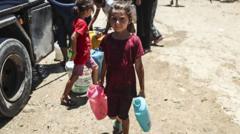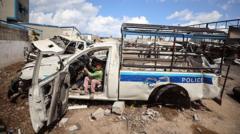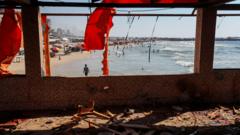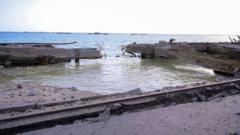The Dinah Project’s recent report accuses Hamas of using sexual violence against women during the October 7 attack on Israel, categorizing these acts as a tactical weapon within a genocidal strategy. It emphasizes the need for accountability while detailing testimonies and evidence gathered from victims and witnesses of the violent incidents.
Allegations of Systematic Sexual Violence Used by Hamas in October Attack Highlighted by New Report

Allegations of Systematic Sexual Violence Used by Hamas in October Attack Highlighted by New Report
A report from an Israeli women-led group claims Hamas implemented sexual violence as part of a "genocidal strategy" during the October 7 attack, emphasizing the urgent need for justice.
The Dinah Project, an all-women group of Israeli legal and gender experts, has released a report asserting that Hamas used sexual violence as a "deliberate genocidal strategy" during the October 7, 2023 attack on Israel. This report is based on a review of first-hand testimonials, including accounts from a survivor of attempted rape and 15 former hostages taken by Hamas in Gaza. The group is demanding justice and has created what they describe as a "legal blueprint" for prosecuting such grievous acts even when individual perpetrators cannot be directly tied to specific offenses.
Hamas has categorically denied that its forces committed sexual violence during the attack or mistreated female hostages. However, a UN investigation determined in March 2024 that there were "reasonable grounds" to suspect the occurrence of conflict-related sexual violence, including incidents of rape and gang rape, especially involving hostages. The International Criminal Court's chief prosecutor had also accused three high-ranking Hamas officials, prior to their deaths, of crimes against humanity that included various forms of sexual violence alongside murder and torture.
The violence on October 7 was catastrophic, with Hamas and affiliated groups attacking southern Israel, resulting in approximately 1,200 deaths and 251 individuals taken hostage. In retaliation, Israel launched military operations in Gaza, with reports of over 57,500 fatalities emerging from the region.
The Dinah Project was established following the events of October 7, spearheaded by figures like legal scholar Ruth Halperin-Kaddar and lawyer Sharon Zagagi-Pinhas, in order to seek justice for victims of sexual violence. Their report released on Tuesday contends that Hamas utilized sexual violence as an operational weapon aimed at instilling terror and dehumanizing Israeli society.
In constructing their report, the group reviewed extensive sources, ranging from social media to recorded testimonies and forensic evidence. They report a chilling account from a female survivor at the Nova music festival on the day of the attack, detailing her experiences of attempted rape and sexual assault. Among the former hostages, one recounted being coerced into sexual acts preceded by severe harassment. Disturbingly, numerous accounts indicated systemic sexual violence, including forced nudity and threats of forced marriages, reported by both male and female captives.
The report highlights that observers recorded numerous instances of gang rapes and other severe sexual assaults, indicating a widespread pattern of violence throughout the conflict. Twenty-seven first responders corroborated claims of sexual violence across multiple locations, pointing to a grim reality where most victims were silenced either through death or severe trauma.
In response to these atrocities, the Dinah Project proposes the first comprehensive legal framework designed to address sexual violence as a weapon of war, even in chaotic scenarios where specific evidence may be lacking or where victims are no longer present. This framework includes strategies to establish criminal responsibility during mass atrocities and a call for the international community to ensure that such grave violations of human rights will not go unpunished.
The report underscores the necessity for justice, asserting that accountability for sexual violence in conflict is vital not only for the victims but also for reinforcing fundamental principles of international law and ensuring that such crimes are met with consequence.





















